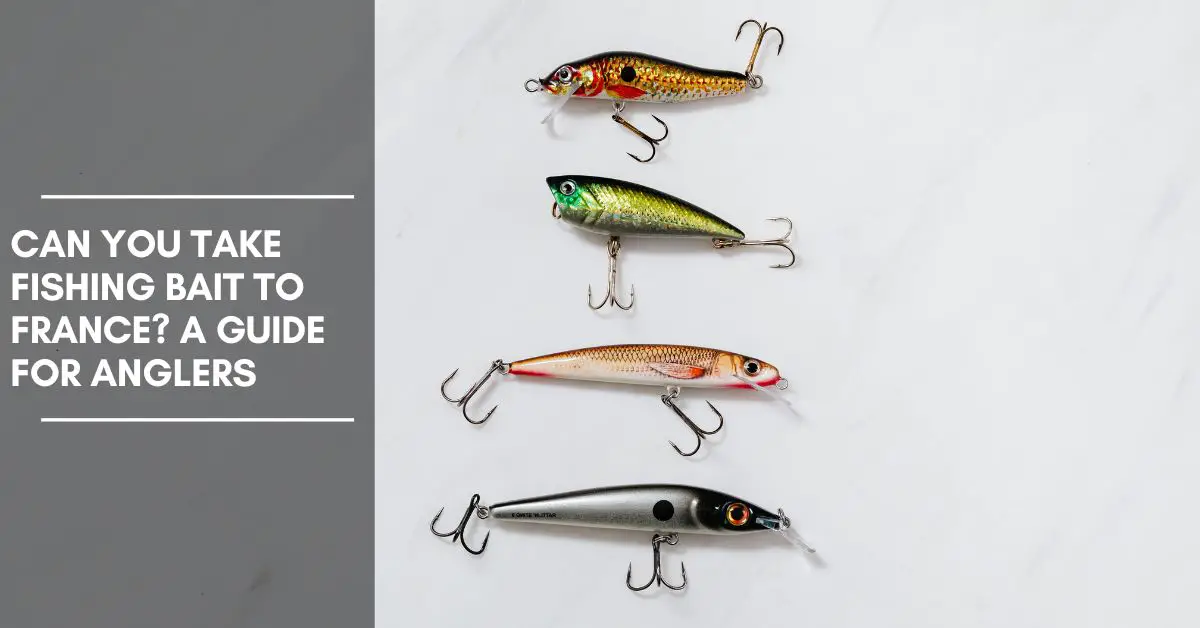Fishing is a beloved pastime for many people around the world, and France is no exception. With its picturesque rivers, lakes, and coastlines, France is a true angler’s paradise. If you’re planning a fishing trip to France, you might be wondering if you can bring your favorite fishing bait along.
In this article, we’ll discuss the rules and regulations surrounding the transportation of fishing bait to France, as well as provide tips on how to properly pack and transport your bait.
So, can you take fishing bait to France? In short, yes, but there are some important guidelines you need to follow. Keep reading to learn more about the do’s and don’ts of traveling with fishing bait and how to make your French fishing adventure as smooth as possible.
Understanding French Fishing Regulations
Fishing licenses and permits
Before you even think about packing your bait, it’s important to ensure that you have the necessary licenses and permits for fishing in France.
This typically includes a “carte de pêche“, or fishing card, which is required for most freshwater fishing. There are various types of fishing cards available, depending on the duration and type of fishing you plan to do. Be sure to research and obtain the appropriate card for your needs.
Bait restrictions
France has specific regulations regarding the use of certain types of bait. For instance, live baitfish are generally prohibited in many areas due to the risk of introducing non-native species or spreading diseases. Make sure to familiarize yourself with the local bait restrictions and guidelines before packing your fishing gear.
Transporting Fishing Bait: Dos and Don’ts
What types of bait can you bring?
You can bring a variety of non-live baits to France, such as artificial lures, flies, and soft plastics. However, it’s essential to ensure that these baits comply with local regulations and are free from any organic material, such as soil or plant matter, which could potentially introduce invasive species.
Packing your bait
When packing your bait for your trip, it’s important to store it securely and properly. Place your bait in airtight containers to prevent leakage or contamination. This is particularly crucial for bait such as boilies or groundbait, which can become messy if not properly contained.
Customs regulations
When traveling to France, you’ll need to declare any fishing bait you’re bringing with you to customs officials. Be prepared to provide information about the type of bait you’re carrying, as well as any supporting documentation if required. It’s always best to err on the side of caution and be prepared to answer any questions that may arise.
Tips for Fishing in France
Learn local fishing techniques
One of the best ways to ensure a successful fishing trip in France is to familiarize yourself with local techniques and strategies. This may involve using different types of bait or adjusting your fishing style to better suit the local environment.
Respect the environment
When fishing in France, it’s important to respect the environment and local wildlife. Always practice catch-and-release fishing whenever possible, and never leave behind trash or fishing gear.
Network with local anglers
Connecting with local anglers can be a valuable source of information and advice for your fishing trip. They can provide tips on the best fishing spots, preferred bait, and other insights that can help enhance your experience.
Conclusion
In conclusion, yes, you can take fishing bait to France, but it’s essential to adhere to the country’s regulations and guidelines. By obtaining the necessary permits, researching bait restrictions, and properly packing your bait, you can enjoy a hassle-free fishing trip in the beautiful waters of France.
Remember to respect the environment, learn local fishing techniques, and network with local anglers to make the most of your experience. Now that you’re armed with this information, it’s time to grab your fishing gear and embark on an unforgettable French fishing adventure.
FAQs
1. Can I use live baitfish while fishing in France?
In general, the use of live baitfish is prohibited in many areas due to the risk of introducing non-native species or spreading diseases. Always check local regulations before using any type of bait.
2. Do I need a special permit to bring fishing bait into France?
While you don’t need a special permit to bring fishing bait into France, you must declare it to customs officials upon arrival. Be prepared to provide information about the type of bait you’re carrying and any supporting documentation if required.
3. Are there any specific types of bait that are prohibited in France?
Certain types of bait may be prohibited or restricted in specific areas. For example, live baitfish are often not allowed. Always research local bait restrictions and guidelines before packing your fishing gear.
4. How should I pack my fishing bait for my trip to France?
Store your bait in airtight containers to prevent leakage or contamination. This is particularly important for bait such as boilies or groundbait, which can become messy if not properly contained.
5. What is a carte de pêche, and where can I obtain one?
A carte de pêche is a fishing card required for most freshwater fishing in France. There are various types of fishing cards available, depending on the duration and type of fishing you plan to do. You can typically purchase a carte de pêche online or at local fishing shops, o tourist offices in France.
6. Is it possible to take fishing bait to France after Brexit?
After Brexit, regulations for taking certain goods between the UK and the EU have changed. It is recommended to check the latest guidelines on the UK government website or the French customs website before taking fishing bait to France. Following the appropriate rules and restrictions will help avoid any potential issues at the border.

